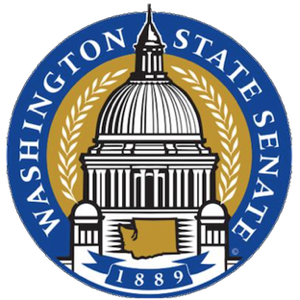The Washington State Senate Law and Justice Committee (WA Senate LAW) considers a variety of subjects relating to civil and criminal law, including issues involving public safety, law enforcement, and sentencing. Civil law topics include commercial law, probate, firearms, eminent domain, Consumer Protection Act remedies and processes. The committee also oversees family law issues such as marriage, child support and adoption.
WA Senate LAW - Committee Meeting
(April 1, 2019)
- USA - Washington
- Washington State Senate Law and Justice Committee (WA Senate LAW)
- WA Senate LAW - Committee Meeting
Monday April 1, 2019 10:00 AM
Observed

Observations
On Monday April 1st, the Senate Law and Justice Committee hosted a public hearing for HB 1792, “Concerning criminal penalties applicable to licensed marijuana retailers and employees of marijuana retail outlets.”
- The Senate Law and Justice Committee hosted a public hearing on HB 1792.
- Shani Bauer, Senior Staff Counsel, outlined the legislation (audio – 2m, video); from the Senate Bill Report:
- Creates a gross misdemeanor crime applicable when an employee of a marijuana retail outlet sells marijuana products to a person under age twenty-one in the course of their employment.
- Provides that an employee of a marijuana retailer may still be prosecuted under applicable felony provisions of the Controlled Substances Act in certain circumstances, including when the employee makes the sale to the underage person outside the course of the person’s employment.
- Creates a misdemeanor crime applicable when a marijuana retailer or employee of the retailer allows a person under the age of twenty-one to enter or remain on the premises of the retail outlet, unless otherwise authorized in law.
- Shani Bauer, Senior Staff Counsel, outlined the legislation (audio – 2m, video); from the Senate Bill Report:
- Brooke Davies, representing the Washington CannaBusiness Association (WACA), said the bill “seeks to align the penalties of the [alcohol and cannabis] industries.” She noted the Washington State Liquor and Cannabis Board (WSLCB) documented a higher rate of compliance when it tested for underage sales in cannabis retail stores versus tobacco or alcohol establishments. Davies highlighted a carve out which would maintain the possibility of a felony charge for budtenders who could be shown to have knowingly sold cannabis to persons under 21. Davies said she was aware of budtenders with otherwise clean records who faced felony charges due to forgetting to check or misreading a customer ID (audio – 3m, video).
- Ranking Member Mike Padden asserted employees charged were not doing their job. He continued, “we have a significant problem in my district. I have three retail shops right on the Idaho border.” Padden said the shops were approved by WSLCB over objections from the community as well as Idaho and Washington law enforcement. He claimed he was “almost certain” Idaho residents buying cannabis products in Washington stores took the products back across the border and may sell them in Idaho. Davies did not directly say sales restrictions by customer origin were not part of the bill but reminded Padden that intentional sales to youth remained a felony. And while “occasionally mistakes do happen,” budtenders faced job loss and industry blacklisting already and shouldn’t face felony charges as well. Padden asked how many people had been charged with this offense. Davies said she knew of three cases and promised to follow up (audio – 4m, video).
- Senator Jesse Salomon asked if charges were occurring as a result of WSLCB compliance checks. Davies answered that her understanding was WSLCB enforcement officers wrote up violations and left it to city attorneys or county prosecutors to decide whether to pursue charges. “So, if you’re in Seattle, or an area like that typically, they don’t seek further enforcement,” she said, but noted an eastern Washington prosecutor had recently filed charges in a case. Salomon asked if the prosecutor had to show that a budtender didn’t check ID, and Davies was uncertain but thought it could be prosecuted either way.
- Samantha Grad, the Political and Legislative Organizer for UFCW 21 testified in “strong support.” She said, “we continue to disproportionately punish people in this industry” despite the plant’s legal status in the state. She felt HB 1792 created “a middle road that allows for accountability when mistakes are made” and that treating it like alcohol or tobacco removed a “crippling fear” budtenders confronted (audio – 1m, video).